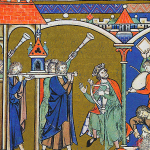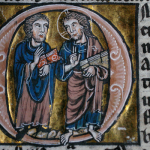Last updated on: August 24, 2016 at 5:04 pm
By
CNA Daily News
Vatican City, Aug 24, 2016 / 11:04 am (CNA/EWTN News).- On Friday a museum dedicated to Pope John Paul I will officially be inaugurated in the hometown of the “Smiling Pope,” whom Pope Francis has often quoted when speaking on the topic of mercy. Though his papal reign is among the shortest in history, summing up to just 33 days, Pope John Paul I was in office long enough to leave a mark. Albino Luciani was born Oct. 17, 1912, in Canale d’Agordo, located in Italy’s northern Veneto region and which sits just over 400 miles from Rome. At the age of 65, he was elected Bishop of Rome, taking the name Pope John Paul I. He was the first Pope to take a double-name, honoring his two immediate predecessors St. John XXIII and Bl. Paul VI. However, his reign was short-lived, as he died suddenly after only 33 days in office, presumably from a heart attack. Despite the fact that John Paul I’s papacy is among the shortest in history, it will now be honored with a museum featuring important documents, personal items and objects used by the Pope. Although there’s been a temporary photo exhibit in Canale d’Agordo since 1978, the display has been renovated and expanded for the new museum, which is located in the city’s old town hall and will be officially inaugurated by Vatican Secretary of State Pietro Parolin Aug. 26. Called the “Albino Luciani Museum,” the launch date was chosen to coincide with the 38th anniversary of John Paul I’s election to the papacy. Cardinal Parolin, who grew up in the same region, will celebrate Mass in the afternoon before the official inauguration ceremony begins. Concelebrating with him will be the Bishop of Belluno-Feltre, Renato Marangoni, as well as the diocese’s Bishop Emeritus Giuseppe Andrich. Since the papacy of “Papa Luciani” was so short, coupled with the fact that it’s sandwiched between the legacy of giants such as St. John XXII, Bl. Paul VI and St. John Paul II, not many people are familiar with who John Paul I actually was, let alone his homilies and writings. However, he is someone that has consistently shown up in the speeches of his current successor, Pope Francis, who seems to find a certain resonance with the way in which John Paul I spoke about mercy. In his recent book-lengthy interview with Italian journalist Andrea Tornielli “The Name of God is Mercy,” Francis quoted each of his predecessors since the Second Vatican Council. However, the one he referred to the most was by far John Paul I. When asked about who he has in mind when speaking about merciful priests, Pope Francis immediately referenced a homily from then-Cardinal Luciani, who used St. Leopold Mandic’s example of a destitute donkey to illustrate what mercy looks like. If a donkey is walking along the road and falls on the cobblestones, one must not “go there with a stick to beat it, poor little thing. It’s already unfortunate enough,” the cardinal had said. Instead, he said a person should take the donkey by the halter and help it up, saying “up, let’s take to the road again…Now we will get back on the road, and we will pay more attention next time.” In his interview, Pope Francis also quoted a 1958 homily by Luciani when was named bishop of Vittorio Veneto. In it, the future Pope said he had been chosen “because the Lord preferred that certain things not be engraved in bronze or marble but in the dust, so that if the writing had remained it would have been clear that the merit was all and only God’s.” Francis marveled to his interviewer how Luciani, as bishop and future Pope, had referred to himself as merely “dust.” He also referred to a general audience given by Luciani after his election as John Paul I, during which the Pope had expressed a strikingly similar opinion to Francis in that true humility comes from the constant awareness of one’s sinfulness. In the audience, which was quoted by Pope Francis in his interview, Luciani said “the Lord loves humility so much that sometimes he permits serious sins. Why? In order that those who committed these sins may, after repenting, remain humble.” Francis noted that a few days later, on separate occasion, John Paul I had insisted that “God hates faults because they are faults. On the other hand, however, in a certain sense he loves faults, since they give him an opportunity to show his mercy and us an opportunity to remain humble and to understand and to sympathize with our neighbors’ faults.” So while Pope John Paul I, declared a “Servant of God” by his successor St. John Paul II in 2003, is likely somewhat unknown to most, it could be said that he was perhaps ahead of his time, and that Pope Francis is carrying his legacy forward. In fact, John Paul I’s cause for canonization is currently being studied by the Congregation for the Causes of Saints, and could advance before too long. During his homily at Mass in the Belluno cathedral July 20, 2014, Emeritus Secretary of State Cardinal Tarcisio Bertone announced that a document, called the “posisio,” advancing the beatification of John Paul I was ready, and would be given to the Congregation for the Causes of Saints that autumn. The beatification process had been stalled because the “positio” had not been completed. The positio is the document that the postulator prepares, presenting the “pros” and “cons” of a person's possible beatification. A miracle has already been attributed to the intercession of John Paul I: the 1992 healing of Giuseppe Denora, from the Diocese of Altamura-Gravina-Acquaviva delle Fonti. Denora was suddenly healed from a malignant tumor in the stomach after seeking the late Pope's intercession. However, the reputed miracle still awaits the approval of both the council of doctors and the council of theologians who work for the Congregation for the Causes of Saints. Should John Paul I’s cause advance to the next stage, he would then be called “Venerable.” Read more















